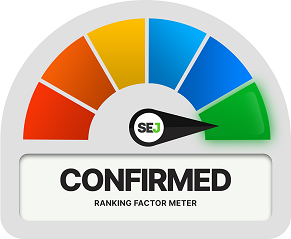Web developers spend a lot of time optimizing page speed to improve the user experience.
In the past, Google gave faster-loading websites higher rankings than slow-loading websites.
This begs the question, “Does page speed affect search rankings today?” If so, how important is it?
This chapter examines the relationship between page speed and SEO and assesses the extent to which speed continues to influence search results.
[Recommended Read] → Ranking factors: systems, signals, page experience
Claim: Page speed is a ranking factor
Fast-loading pages were thought to increase in Google’s search rankings.
Speed is measured by how quickly a page loads after clicking a link in a search result, and is currently assessed by Core Web Vitals metrics.
Google’s PageSpeed Insights tool measures page load speed, further reinforcing the claim that speed affects rankings.
These assumptions stem from the perception that Google wants to provide pages with a good user experience, so fast pages are considered an advantage.
It’s more satisfying when the page loads instantly after a click. This is the idea behind Accelerated Mobile Pages (AMP).
A search results page with super-fast links may seem ideal, but slower, more relevant pages may be excluded.
This is where the discussion of page speed as a ranking factor falls short.
Google has repeatedly stated that relevance is the top ranking factor. If fast pages are automatically ranked, more relevant content that better answers the query will appear higher, potentially to the detriment of searchers.
Improving speed at the expense of quality penalizes users.
The claim that page speed affects rankings is controversial and there is a lot of debate in SEO. Let’s examine the evidence to dispel some misconceptions about page speed.
Previous evidence on page speed as a ranking factor
Google has long considered website speed to be a factor in search engine rankings, and in April 2010, its algorithm began incorporating site speed when determining search result rankings. Then he announced.
At the time, Google said:
“Like us, our users value speed, so we decided to factor site speed into our search rankings.”
This first change was applied to desktop search results. In July 2018, it took nearly another decade for Google to finally make page speed a ranking factor in mobile search results.
The company’s announcement reads:
“Users want to find answers to their questions quickly, and our data shows that they care a lot about page load speed.
The search team announced that speed will become a ranking factor for desktop search in 2010, and as of this month (July 2018), page speed will also become a ranking factor for mobile search. ”
Current evidence for page speed as a ranking factor
In April 2023, Google updated its documented ranking systems page and removed the “Page Experience” system as one of its ranking systems. But “Page Experience” now has its own page in the document, and Google was careful to make it clear that the algorithm directly rewards good page experience signals.
Still, removing “page experience” from ranking system pages was an unexpected change within the SEO community. Page speed is part of the page experience, but what does this mean for speed as a ranking factor?
The switch comes on the heels of Google’s Helpful Content Update, which aims to give pages experience, expertise, authority, and trustworthiness based on semantic analysis rather than quantitative metrics. Ta.
In its page experience documentation, Google makes clear that there are many signals that influence page experience. Load times may or may not be weighted within this system, so page speed is still a ranking factor, but it doesn’t always have a huge impact.
Google’s core philosophy has always been that relevance is most important, and fast load times don’t necessarily equate to high-quality, useful content. Good content that is slightly slower may rank higher than bad content that loads faster. This also doesn’t mean page speed isn’t important. Page experience is part of how users interact with content, and algorithms evaluate good page experience factors such as speed.
With increased mobile browsing and improved bandwidth, page speed may be less of a differentiating factor than it was a decade ago, when slower connections were more common.
It is clear that this change is an organizational issue and not an actual algorithm change.
[Ranking Factors 2023] Download free ebooks and cheat sheets →
Yes, page speed is still a ranking factor

As of April 2023, page speed is still a confirmed ranking factor in Google’s search results. It may not always have a strong impact, but it is a signal when evaluating the page experience.
Page speed is still important for user experience, but if your content is problematic, page speed may not directly impact your search rankings.
According to Google, relevance remains the number one ranking factor. Page experience is important as far as it affects a user’s ability to access her website, and speed is also a part of it.
Featured image: Paulo Bobita/Search Engine Journal


